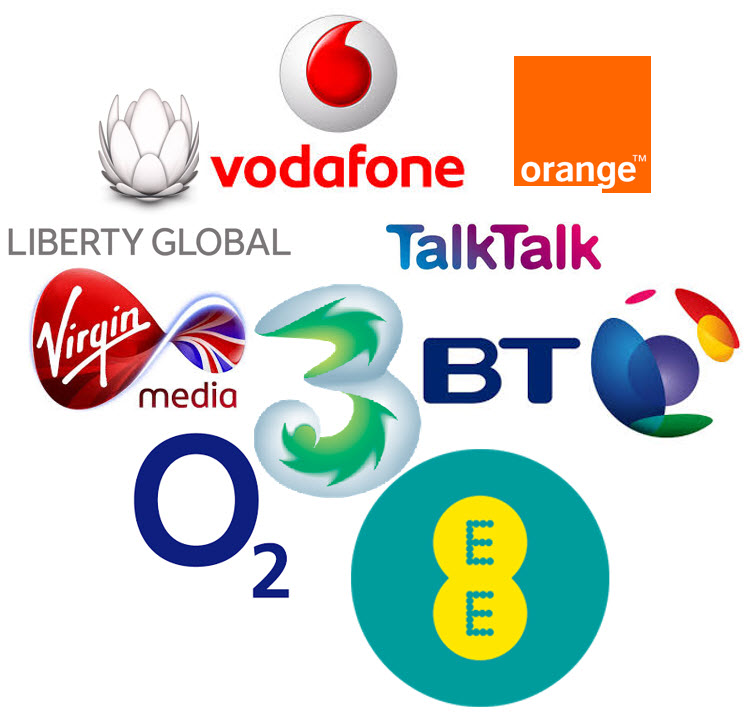And exciting 2015 looms…
In recent weeks, early signs of big changes to come in the UK’s telecom landscape have sparked off speculation as to which of the key players might join forces, or possibly even quit the UK scene to re-invest elsewhere. Why now?
UK consumers and businesses enjoy one of Europe’s most competitive Telco market, due to the number of operators and presence amongst them of some game changers, such as Talk-Talk, who upset the cosy rules that prevailed on the market when British Telecom had to give up its monopoly. Such competition obviously leads to meagre margins, and the belief of many of the operators is that end-users need to be offered a “bundle” of services, covering fixed and mobile telephone, internet access and on-line TV content.
 Just in the same way mobile phone tariffs are difficult to decipher, those all-in-one “quad” service bundles blur the cost of each of the services; and so the proliferation of such bundle offers in recent years is possibly better explained by the fact that they protect the operators’ margins rather than offer the end-users any tangible benefits. If that were not the case, the take-up of these new bundle offers would have seduced more than the current 17% of users who have subscribed to them. Selecting a common supplier for fixed telephone and broadband makes logical sense, particularly with the generalisation of voice over IP, but I strongly suspect that the choice of mobile provider is also strongly influenced by territory coverage (which is still quite imperfect in the UK), roaming tariffs and the choice of features offered by the operator, rather than a supposed simplification resulting from having just one supplier for all of the services.
Just in the same way mobile phone tariffs are difficult to decipher, those all-in-one “quad” service bundles blur the cost of each of the services; and so the proliferation of such bundle offers in recent years is possibly better explained by the fact that they protect the operators’ margins rather than offer the end-users any tangible benefits. If that were not the case, the take-up of these new bundle offers would have seduced more than the current 17% of users who have subscribed to them. Selecting a common supplier for fixed telephone and broadband makes logical sense, particularly with the generalisation of voice over IP, but I strongly suspect that the choice of mobile provider is also strongly influenced by territory coverage (which is still quite imperfect in the UK), roaming tariffs and the choice of features offered by the operator, rather than a supposed simplification resulting from having just one supplier for all of the services.
Join forces, stay as is, or quit?
Telecom operators have not had it easy in the last few years; websites and on-line applications require ever increasing flows of data as digital content is consumed through real-time streaming, forcing the providers to offer ever-growing bandwidth for which the end-users are not prepared to pay any more than they did in the past.
Whilst the strong competition that has prevailed thus far in the UK has created a very favourable environment for end-users by keeping prices down, the margins generated on the UK market are probably insufficient over time to allow the massive and continuous investments that will be required to satisfy the users’ appetite. If bundling fixed telephony, broadband access, mobile telephony and digital content is the only way of protecting the revenue required to growth further and survive in this very demanding market, dedicated mobile operators such as Vodafone, O2, Three or EE, will need to seek alliances to gain presence across the spectrum of telecom services, and this will require them to have cost effective access to fibre networks.
Vodafone has already taken a few steps in that direction with the recent acquisition of Ono in Spain and Kabel Deutschland, so it would only be logical for that company to seek a similar move in the UK to build further on its 2012 acquisition of Cable & Wireless. Current speculation about Vodafone making a bid to acquire Liberty Global, which operates Virgin Media in the UK as well as very high-speed broadband networks in ten other European countries, would allow Vodafone to leapfrog ahead of its competitors. If the regulators don’t object to such a concentration of control over fibre networks in Europe, the other players will be forced to either rent the networks owned by BT or Vodafone, or pull out of the British market. Building an alternative broadband fibre network would be another possibility, but it could prove prohibitively costly, unless that third offering were limited to a few large conurbations where the density of users might justify the huge investment.
One thing is certain. If Vodafone teams up with Liberty Global, the other mobile operators will not survive on a status quo and will be forced to move.
Exit the UK market, really?
What would have sounded inconceivable a year or so ago is becoming a distinct possibility; or at least it is envisaged by EE, the joint venture of Orange and Deutsche Telekom, as well as by O2. Both companies are reported to be exploring the possibility of selling their UK businesses to BT and exiting the exceedingly competitive British mobile business, to seek their fortunes elsewhere, in countries where a consolidation of fixed and mobile telephony with broadband networks may be easier to achieve rapidly.
If the so-called “quad” bundles of services are really the panacea that will allow telcos to thrive in Europe, then something big is likely to spark-off during 2015, but the magnitude and complexity of any deal, as well as the scrutiny to which such deals will be inevitably submitted by the regulatory authorities, means that the European telecom landscape may take much longer before any radical change really materialises.